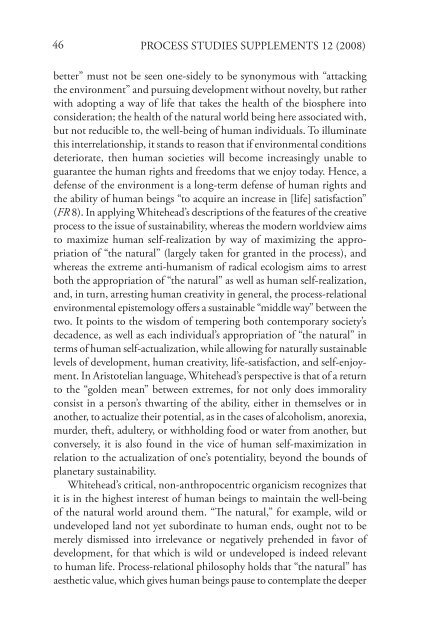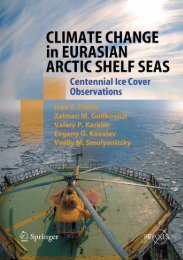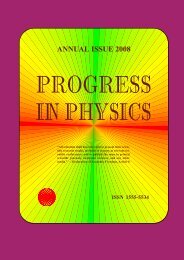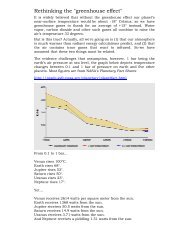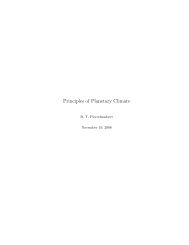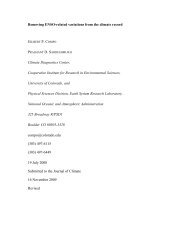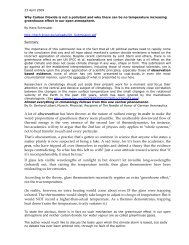Process Studies Supplement Overcoming Anthropocentric ... - Here
Process Studies Supplement Overcoming Anthropocentric ... - Here
Process Studies Supplement Overcoming Anthropocentric ... - Here
Create successful ePaper yourself
Turn your PDF publications into a flip-book with our unique Google optimized e-Paper software.
46<br />
PROCESS STUDIES SUPPLEMENTS 12 (2008)<br />
better” must not be seen one-sidely to be synonymous with “attacking<br />
the environment” and pursuing development without novelty, but rather<br />
with adopting a way of life that takes the health of the biosphere into<br />
consideration; the health of the natural world being here associated with,<br />
but not reducible to, the well-being of human individuals. To illuminate<br />
this interrelationship, it stands to reason that if environmental conditions<br />
deteriorate, then human societies will become increasingly unable to<br />
guarantee the human rights and freedoms that we enjoy today. Hence, a<br />
defense of the environment is a long-term defense of human rights and<br />
the ability of human beings “to acquire an increase in [life] satisfaction”<br />
(FR 8). In applying Whitehead’s descriptions of the features of the creative<br />
process to the issue of sustainability, whereas the modern worldview aims<br />
to maximize human self-realization by way of maximizing the appropriation<br />
of “the natural” (largely taken for granted in the process), and<br />
whereas the extreme anti-humanism of radical ecologism aims to arrest<br />
both the appropriation of “the natural” as well as human self-realization,<br />
and, in turn, arresting human creativity in general, the process-relational<br />
environmental epistemology offers a sustainable “middle way” between the<br />
two. It points to the wisdom of tempering both contemporary society’s<br />
decadence, as well as each individual’s appropriation of “the natural” in<br />
terms of human self-actualization, while allowing for naturally sustainable<br />
levels of development, human creativity, life-satisfaction, and self-enjoyment.<br />
In Aristotelian language, Whitehead’s perspective is that of a return<br />
to the “golden mean” between extremes, for not only does immorality<br />
consist in a person’s thwarting of the ability, either in themselves or in<br />
another, to actualize their potential, as in the cases of alcoholism, anorexia,<br />
murder, theft, adultery, or withholding food or water from another, but<br />
conversely, it is also found in the vice of human self-maximization in<br />
relation to the actualization of one’s potentiality, beyond the bounds of<br />
planetary sustainability.<br />
Whitehead’s critical, non-anthropocentric organicism recognizes that<br />
it is in the highest interest of human beings to maintain the well-being<br />
of the natural world around them. “The natural,” for example, wild or<br />
undeveloped land not yet subordinate to human ends, ought not to be<br />
merely dismissed into irrelevance or negatively prehended in favor of<br />
development, for that which is wild or undeveloped is indeed relevant<br />
to human life. <strong>Process</strong>-relational philosophy holds that “the natural” has<br />
aesthetic value, which gives human beings pause to contemplate the deeper


